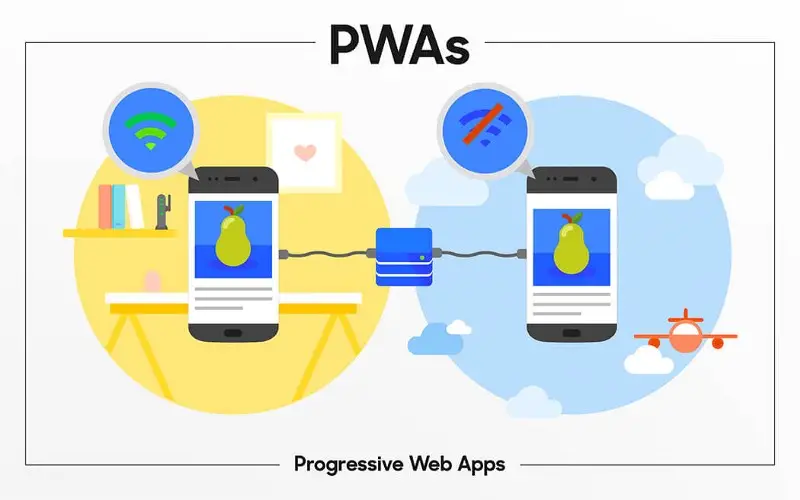In the fast-paced world of mobile apps, mobile app development companies are constantly looking for new ways to improve user experience and optimize app performance. One of the most exciting innovations in this field is the concept of Progressive Web Apps (PWAs). These apps offer a range of benefits, including enhanced user engagement, faster loading times, and the ability to work seamlessly across various devices. By incorporating PWAs into their strategies, mobile app development company can deliver cutting-edge solutions that elevate the user experience and stay ahead in the competitive app market.
In this article, we'll explore in detail what PWAs are, why they're important for your mobile apps, and how you can get the most out of them.
What are Progressive Web Apps?
Progressive Web Apps, or PWAs, are an evolution of traditional web applications that have been designed to work optimally on mobile devices. Unlike native apps that install on your device, PWAs are accessible through a web browser and offer a native app-like experience. The distinctive feature of PWAs is their ability to work offline and load quickly, making them ideal for improving the experience of your mobile users.
Key Features of PWAs
PWAs have a number of key features that distinguish them from traditional web applications:
Offline Work
One of the main advantages of PWAs is their ability to work without an Internet connection. This means that users can access the app even when they don't have access to a network, significantly improving usability and convenience.
Fast Charge
PWAs are designed to load quickly and efficiently, providing a smooth user experience. This is essential in a world where the loading speed of a website or application can mean the difference between a sale made and a missed opportunity.
Automatic Updates
Unlike native apps, which often require manual updates, PWAs update automatically. This means that users will always enjoy the latest version of the app without having to worry about downloading and installing updates.
Advantages of PWAs for Your Mobile Applications
Now that we understand the key features of PWAs, it is important to highlight why they are relevant and advantageous for your mobile applications.
Greater Audience Reach
PWAs' accessibility is one of its main benefits. They can be used on any device with a web browser, significantly expanding your audience reach. This is especially relevant in a world where the diversity of mobile devices is overwhelming.
Lower Development Cost
The process of creating native apps for several platforms may be costly and time-consuming. PWAs offer a more cost-effective solution as they can be created once and run on multiple operating systems.
Improved User Experience
PWAs offer an exceptional user experience by loading quickly, working offline, and being easily updatable. This results in higher user retention and customer satisfaction, which is essential to the success of your mobile apps.
How to Incorporate PWAs into Your Mobile Apps
Responsive Design
Make sure your website or app is responsibly designed to work optimally on mobile devices. This is essential to ensure a good experience on mobile devices.
Service Workers
Service Workers are an essential part of PWAs, as they are responsible for enabling offline functionality and automatic updates. Make sure you implement them correctly on your website or app.
Application Manifesto
An app manifest is a JSON file that describes your PWA and provides information such as the app name, icons, colors, and more. Make sure you create a proper app manifest and link to it on your website.
Secure Domain Registration (HTTPS)
PWAs will only work on secure connections. Make sure your website or app is configured with an SSL certificate to ensure the security of your users' data.
PWA Promotion
Once your PWA is ready, promote it properly so that users discover and use it. This may include online marketing and advertising strategies.
Do PWAs work in all browsers?
Yes, mostly. PWAs are designed to work on a variety of modern web browsers, including Chrome, Firefox, Safari, and Microsoft Edge. However, it is important to test in different browsers to ensure compatibility.
What distinguishes a native application from a PWA?
The main difference lies in the way they are delivered and stored. PWAs are delivered through a web browser and require no downloads or installations, while native apps are installed on the user's device. Additionally, PWAs are cross-platform and update automatically, while native apps must be updated manually through app stores.
Are PWAs secure?
Yes, PWAs are safe as long as recommended practices for online security are adhered to, such securing sensitive data and utilizing secure connections (HTTPS). As with any website or application, security depends on proper implementation and maintenance.
In short, Progressive Web Apps (PWAs) are an innovative solution to enhance your mobile application development services. They offer significant advantages, such as greater accessibility, lower development costs, and improved user experience. Implementing PWAs in your mobile application development strategy can make a difference in an increasingly mobile and connected world, providing a seamless and efficient solution for users engaging with your services on various devices.





